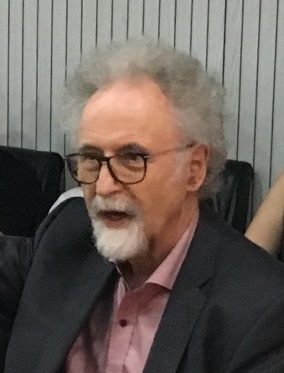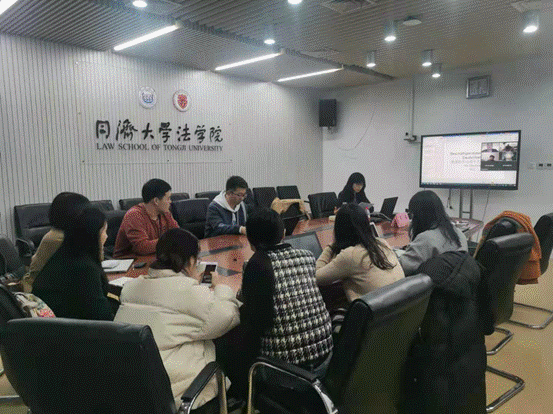On December 10th, 2020, the seminar on "Personal Information Protection in Labour Relations: Taking Germany as an Example" was successfully held online and offline simultaneously at Room1302 Zhonghe Building, Tongji University and Zoom meeting room. The lecturer was Prof. Wolfgang Däubler, from the Faculty of Law, University of Bremen, Germany. The reviewers were Prof. Yu Shuhong, from the Law School of Wuhan University, Prof. Wu Wenfang, a researcher from the Shanghai University of Finance and Economics, as well as Yu Hui, a lecturer at the School of Civil, Commercial and Economic Law, China University of Political Science and Law. This seminar was hosted and translated by Prof. Wang Qian from Tongji Law School. Nearly a hundred audiences of teachers and students attended the lecture online and offline.

Prof. Wolfgang Däubler

Firstly, Prof. Däubler introduced the 50-year history and milestones of personal data protection development in Germany. He pointed out that the history of personal data protection in Germany originated from the legislation of Hesse-Darmstadt in 1970. After that, the first "Federal Data Protection Act" was formulated in 1977. And the Federal Constitutional Court's judgment has recognised the " Right of Information Self-determination" (Recht auf informationelle Selbstbestimmung) based on the Census Case (Bundsverfassungsgerich.65 BVerGE1) in 1983. Apart from those, both the 1994 European Community Data Protection Directive and the 2016 EU General Data Protection Regulation have made a great difference on German data protection legislation.
Next, Prof. Däubler has analysed the reasons for these changes on personal data protection over the past 50 years. He believes that one of the most important reasons lies in the development of personality protection. The development of information technology is accompanied by special "dangers." To be specific, the data controller has access to a large amount of data, which could lead to great power. And individuals gradually become the object of decision-making. Worse, the opacity of data processing has exacerbated this danger. When it comes to labour relations, this danger becomes much more severe due to strong capital and weak labour relationship. Meanwhile, he took some scandals in which employers infringed on employees’ personal information from 2008 to 2009 as examples, such as the scandal in which the supermarket, Lidl, had used hidden cameras and hired private detectives to monitor its employees. These incidents have aroused public attention to the protection of personal information, which have also forced enterprises to pay attention to compliance issues and to formulate related policy.
Moreover, Prof. Däubler has given detailed explanations on some relevant legal concepts, including the identifiability of personal information, scope of data processing, and their legitimate basis. He has also introduced the consent of the data owner, the authorization of the data protection law and other laws and regulations, emphasising that every stage of data processing should be based on a legitimate basis. Through the introduction of some typical cases, he gave a vivid interpretation of the recruitment, video surveillance, biometric information processing, sound analysis, which would be involved before and/or within the labour relationship. Based on the consulting projects that he has personally involved in, he believes that Algorithms and other automated decision-making might pose a threat to both employees and employers.
By the end of his report, Prof. Däubler has also briefly introduced the corresponding arrangements for data protection. It includes at less 6 approaches: Firstly, following the principles of "Data Minimization" when designing related equipment and software. Secondly, considering and evaluating negative consequences of information collection. Thirdly, appointing data protection officers, who will be in charge of training relevant personnel for data processing. Fourthly, ensuring the supervision of the employee committee of the enterprise, so that it will protect the complaint rights of victims. Finally, setting up a strong supervision department and increasing the deterrence of punishment.
During the reviewing session, Prof. Yu Shuhong of Wuhan University compared the differences on the protection of employees’ personal information in China and Germany, pointing out that China’s personal data protection system started relatively late but developed very rapidly. She has also shared opinions on issues related to the protection of personal information of consumers and workers, the distinction between personal information and personal privacy. Researcher Wu Wenfang pointed out that German data protection began in the era of small data, while the protection of personal information in China began in the era of big data. The difference has led to different values of protection in the legislative process. In China, the lack of personal data protection is closely related to its attempt of creating positive value by using these data. Lecturer Yu Hui has also shared her opinion that controlling and limiting the employer’s technical superiority would be crucial to this problem. By establishing the principle of humility, specifying the employer’s protection obligations, and establishing a special supervisory agency, the protection of employees’ personal information can be better achieved.
Finally, after Prof. Däubler briefly responded to the reviews, Prof. Xie Zengyi from the Chinese Academy of Social Sciences, Dr. Yang Yayun from the University of Bremen, and Attorney Zhang Dan from Yingke Law Firm have raised several theoretical and practical issues regarding to this report. Prof. Däubler gave detailed responses respectively and encouraged everyone to have further communications through emails after the meeting. The three-and-a-half-hour seminar finally ended successfully with a big round of applause.